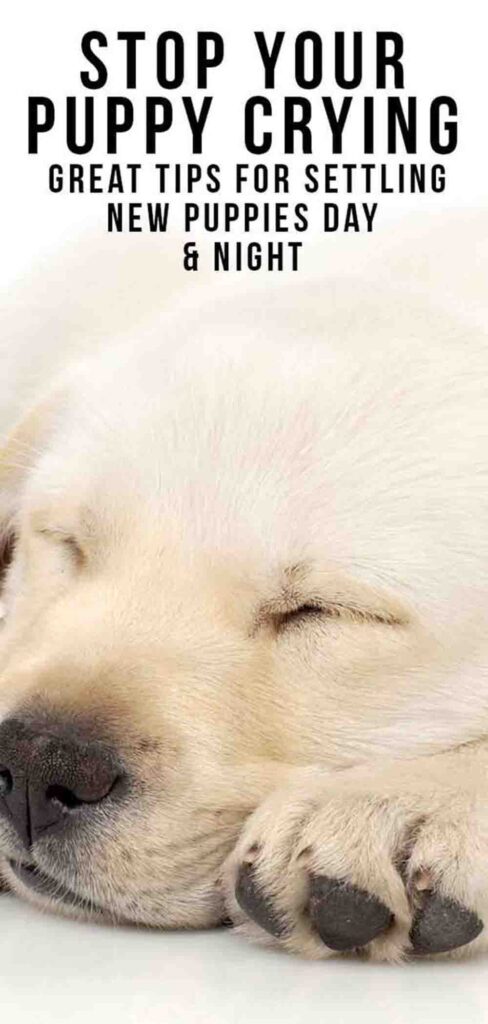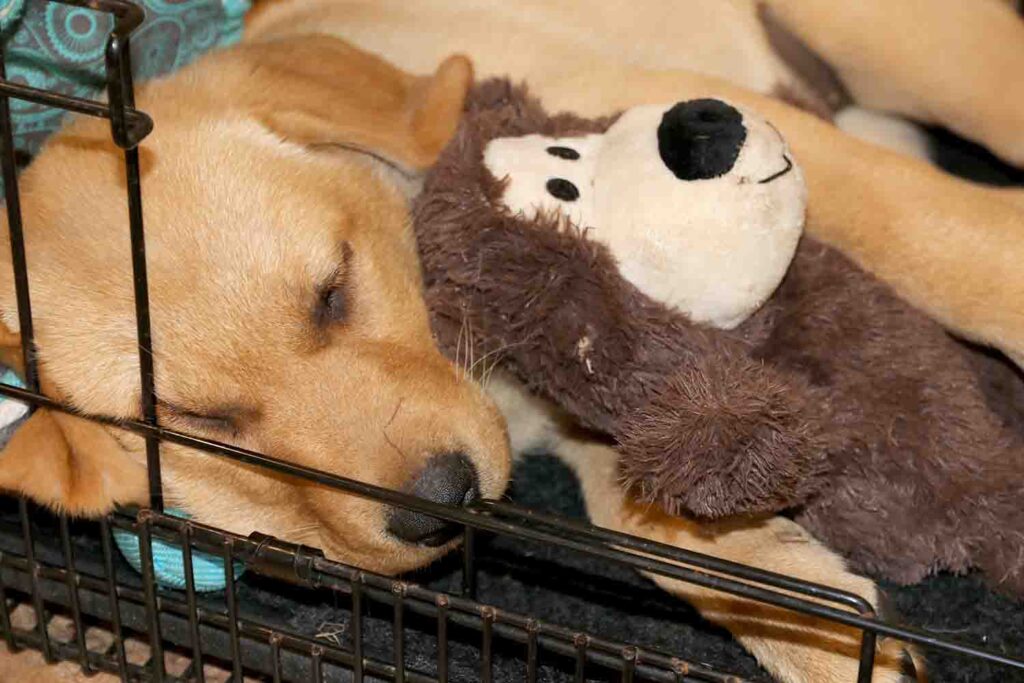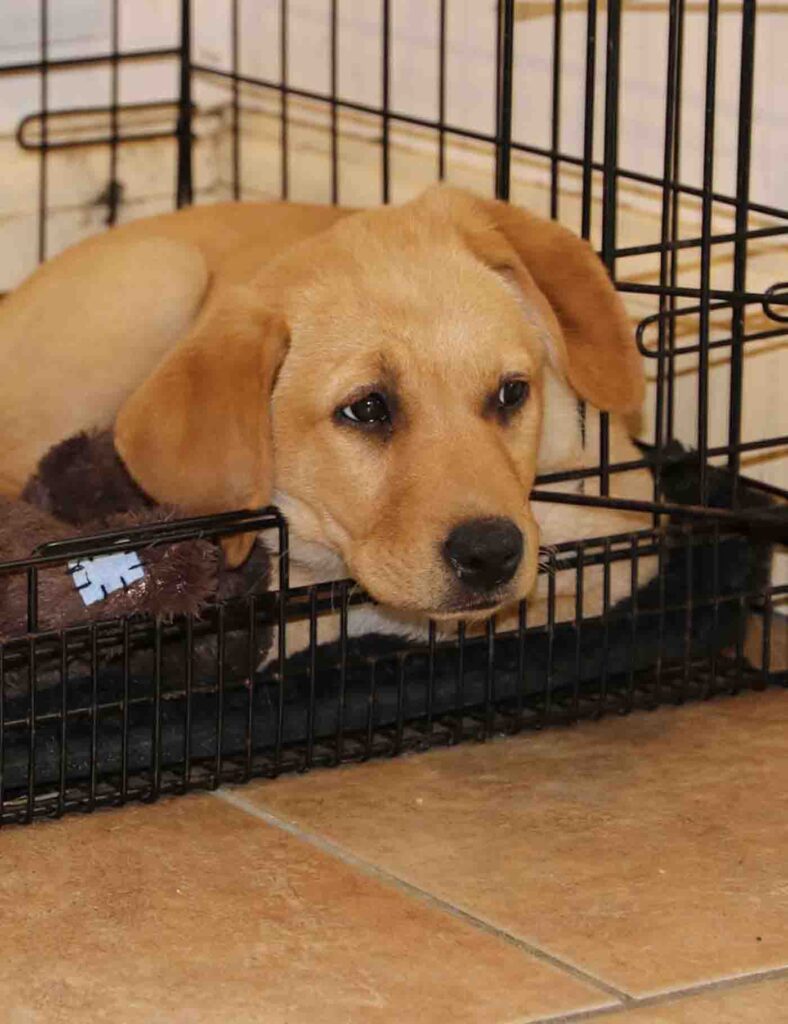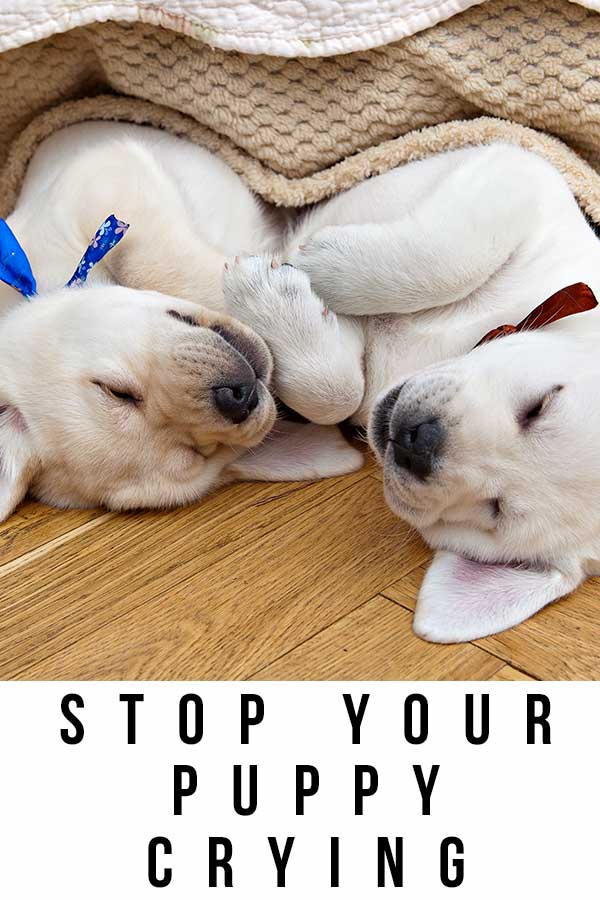How To Stop Your Puppy Crying
Dealing with a crying puppy can be stressful and upsetting. Especially if you have close, grumpy neighbors to contend with.

But puppies need to communicate their feelings to their family. And crying or whimpering is a small puppy’s way of telling you they are sad or lonely.
Fortunately, I have lots of tips to help your new puppy settle in, calm down and stop whining. I’ll show you how to avoid triggering your puppy’s fear response or accidentally teaching them to cry for attention. And I’ll explain why its important to keep your puppy close at first, only increasing periods of alone time very slowly.
- Why do new puppies cry so much?
- When do puppies stop crying at night?
- How to stop puppies crying during the day
- What to do with a puppy whining in the crate
- Stopping a puppy crying when left alone
In this guide I’ll look at why some puppies howl in their crate, and show you how to crate train a puppy who doesn’t like their crate. I also share the reasons why puppy crying might start at bedtime or early in the morning, and how long you can leave your puppy to cry for. I’ll give you tips for crate training at night, and show you how to make your puppy stop crying and get back to having fun.
Why Do Puppies Cry?
Like most baby mammals, puppies cry to get their needs met, and to alert those who care for them that they are in danger. Puppy crying is usually a response to a strong physical or emotional need. Such as pain, hunger, full bladder or bowels, or plain fear.
As puppies grow they may also learn to cry in order to get attention. Learned crying happens when the sound the puppy makes has been regularly rewarded in the past. That comes later, but you need to be aware of it so that you don’t create problems for yourself.

Why Do New Puppies Cry So Much?
Most well fed puppies rarely cry from pain or hunger. And unless they are trapped in their bed, they don’t usually cry with a full bladder. They just pee where they are standing. So, during the first few days, your puppy crying will usually be from fear. This is not something that he is doing deliberately or that he can control.
Think of it as homesickness. Only worse. Puppy first night ‘blues’ are so common as to be normal. That’s because your puppy doesn’t know when he is going to go home again, or where his family is. Fortunately very young puppies have short memories and soon get over their sadness but for those first few days your puppy will be a little bit scared, even if he doesn’t show it. And he will be especially scared if he is left alone.
That doesn’t mean that you and your dog must be joined at the hip forever, but it does mean some temporary changes in your own lifestyle. We’ll come back to that in a moment.

Why Do Puppies Cry At Night?
Most small puppies actually sleep quite well at night, if they are close to a grown up! But what if your puppy won’t sleep unless you are there?
Puppy won’t sleep unless next to me!
Much of the night time puppy crying that new puppy parents experience is caused by attempting to get a puppy to sleep alone on their very first night. Years ago I used to take this approach with my puppies. I found that sometimes it works out, and the puppy cries for a while and then goes to sleep. Mostly it ends with you lying awake with your fingers in your ears, while your puppy screams the night away in the kitchen.
Letting your puppy sleep next to you for the first few nights or even the first few weeks is not going to cause you long term problems. This is what I usually do now with my puppies, and I’ll explain how you can use this temporary arrangement to your advantage.
Placed in a box or crate by your bed, the vast majority of puppies will sleep for several hours at a time. But most will need to wake and get up once or twice at night to go and pee. So the other cause of night time puppy crying is often due to the puppy needing to answer the call of nature.
Leaving a puppy to sleep alone
If you don’t want to get up at night to be with your puppy and you don’t want the puppy to sleep in your room, it’s important to make sure that the puppy can leave their bed to pee and poop on some puppy pads. You don’t want the puppy to be forced to pee in their bed and most new puppies won’t last all night without emptying their bladder at least once.
How long does it last?
If your puppy has spent the first week or so sleeping next to you, and has now been moved into their permanent night time quarters, you should find that any puppy crying at bedtime will be brief. We’re talking ten or fifteen minutes, for maybe a couple of nights. My mother always liked to use an old fashioned ticking alarm clock for puppies, the noise may be soothing to them.
On the other hand, if left alone from the very first night, the chances are your puppy will cry very loudly for some time. If you then go and get them up again, they will cry louder and for longer next time. In my experience, this can last for several nights, even for a week or more. So should you leave your puppy to cry it out?

Should I Leave My Puppy To Cry At Night?
If you leave your puppy to cry at night, there are some problems that can arise, these include:
- Sleep disturbance
- Waking the neighbors
- Soiling
- Separation anxiety
- Puppy screaming in the crate for hours
You may think that the puppy will go off to sleep quite quickly. But it doesn’t always work out that way. I have had puppies will cry for most of the night. And unless you live in a soundproofed room or own a mansion, you will be able to hear the noise. Not only will you hear it, your neighbors will hear the puppy too. And they are unlikely to be happy about it.
If you can’t hear the puppy crying, you won’t know when they need to go outside to pee. And puppies left to cry it out at night may become so distressed that they have diarrhea. Which they will then walk in and get in their fur. I can tell you from experience, that shampooing a puppy in the wee small hours of the morning is no fun!
It’s possible that the distress could cause longer term problems such as separation anxiety. All in all, having the puppy by your bed for a few nights, is looking like the more attractive option.
Are we talking minutes, or hours?
Although some puppies give up within half an hour or so, if you leave them to cry, the other issue with leaving a puppy crying, is that some of them have quite amazing stamina, and can literally keep crying all night!
How To Stop A Puppy Crying At Night
You can stop a puppy crying at night by bringing them next to your bed in a box or crate. The puppy can smell and hear you and if they stir or get upset to begin with, you can reassure them with your hand.
Even though your new puppy is far away from their familiar den on the first night in your new home, if they are next to your bed they won’t be scared and you’ll both be able to sleep. This doesn’t have to be a permanent arrangement. You need to spend some time over the next few days preparing your puppy for the transition to their permanent sleeping quarters.

When Do Puppies Sleep Through The Night?
Provided they can get out of their bed to pee, your puppy will stop crying when left alone at night, once they have a familiar, safe, ‘den’ in which to sleep. At the moment nothing in your home is familiar.
Small puppies in the wild are extremely vulnerable and it is vital for their survival that they are never left unattended unless in the safety of their den. So puppy crying is an instinctive cry for help if they find themselves alone outside their den. And puppies will rest happily when they are inside it. You need to create that ‘den experience’ in your home. Your puppy doesn’t need a fancy bed or expensive blankets. It’s all to do with familiarity.
Preparing for a happy puppy bedtime
Over the next few days it’s important to keep leaving treats and toys in your puppy’s new crate or basket, so that it gradually becomes your puppy’s place of safety. Their happy place.
This doesn’t take very long if you are persistent and generous. You can use much of your puppy’s food ration up in this way. Your puppy will soon be taking themselves off happily into their crate for daytime naps. And in a few days they will be able to sleep there at night too, without being afraid.
How long do puppies sleep at night?
Most puppies sleep quite well for about ten hours, from mid evening until early morning (about 8pm until 6am) with a bathroom break at your bedtime and for the first two weeks, again during the night.
It’s tempting to encourage a puppy to zoom around during the evening in the hopes of wearing them out, but it’s not usually effective and can make things worse. A sensible bedtime, just as you would for a small child, helps the puppy to relax and sleep deeply. Crating a puppy at night really helps if you want to establish a bedtime for them. Getting your puppy to sleep at around 8pm in their crate, but letting them out for a last pee at 11pm, is a good way to get the night started well.
Should you close a puppy crate at night?
If you crate train your puppy during the day and establish the crate as a lovely den, then when you come to put them to bed at night you should close the door.
How To Stop A Puppy Crying During The Day
Some puppies will cry if they are very hungry, but many will not, so don’t be tempted to use crying as an indicator that your puppy needs more food.
The most common cause of puppy crying during the day is as a result of the puppy being left alone while the grown ups go to another room. The best way to avoid this problem is to keep your puppy with you as much as possible for the first few days, then to teach them to be alone in easy stages. Here’s a quick summary
Teaching A Puppy To Be Alone
There are three stages to this training.
- Crate Conditioning
- Crate Nap Training
- Leaving The Room
Most puppies need to be crated when left alone, to keep them safe. Being left in a crate is actually two new things: being shut in, and being left. If you get the puppy used to being shut in a crate before you leave them alone, you’ll find the whole process easier for both of you.
Crate conditioning
The process of crate conditioning is all about getting the puppy used to being put in the crate. Having the door shut behind them and then being let out again (immediately to start with)
Should my puppy nap in the crate?
This is where you put a sleepy puppy into a crate and wait for them to go to sleep. During crate nap training, you need to stay near your puppy, in the same room. If you want to watch tv bring the crate in with you.
Leaving the room
This is the final stage where you start leaving the room for very short periods of time. Just a few seconds to begin with.

How Long To Let A Puppy Cry In A Crate
When you start crate training your puppy may protest at being shut in. But how long should you let a puppy cry in a crate? It’s best if you do not repeatedly leave your puppy to scream. Leaving a puppy to cry it out is a risky strategy. Many puppies will to cry long enough that they need to toilet again. Then you have a crying and a bed wetting problem on your hands.
The answer is to build your puppy’s ability to relax on their own in a crate, in stages. A puppy that yells if you leave the room for five minutes, needs to go back to being left for only a minute or so with plenty of treats fed through the bars at intervals which you can gradually space out. And you also need to avoid teaching your puppy to cry in order to get you to let him out.
Crate Training A Puppy At Night
Crate training a puppy at night is different (and easier) than crate training during the day. And even if your puppy objects to be crated during the day they are likely to sleep happily in a crate at night, provided that the crate is near to you (or another dog) for the first few nights.
Learned Crying In Puppies
Puppies learn through the consequences of their behavior. And they learn very quickly indeed. If a good thing happens when the puppy cries, his crying will be reinforced (ie more likely to occur again in the future). He will learn to use the crying in order to fulfil his wish for more food, cuddles, attention, company and so on. Even when he does not feel threatened or anxious.
Many puppies fall asleep quite quickly in their crates to begin with and the family gets on with life, relying on the puppy to let them know when they are awake and ready for more fun. But the puppy’s only way of letting them know he wants to get up again is by whining. And this can quickly become a habit.
Whining In The Crate
Whining in the crate tends to happen because the puppy has learned to whine in order to get the door open. And whining to be let out of the crate is really common. And the best way to avoid it, is to get your puppy up before they start whining. So that the habit never becomes established.
When you are crate nap training, wake your puppy after 15 minutes or so of sleep. Play a little while, then put the puppy back in the crate for another nap. Don’t wait until the puppy cries before you get them up, and if they do cry, don’t open the door until they stop. It is essential if you crate your puppy during the day or at night, that you give him chance to leave the crate often enough to keep himself clean.

Teaching Puppies To Be Alone
It is nice to see that some veterinarian puppy packs are including information on teaching puppies to be alone. If you go out to work, then your puppy will probably be spending some time alone from an early age. But not all puppies learn this valuable skill.
One of the things that my own veterinarian’s leaflets stress is that puppies that do not learn to be left alone before they are thirteen weeks old, are more likely to suffer from separation anxiety later on. In other words, the experience of being ‘alone’ sometimes, is one that puppies need to get used to at an early age. This is a part of the socialization ‘package’ that we need to work through with our puppies.
This isn’t an excuse to leave a puppy for long periods of time, or in unfamiliar places. But within a couple of weeks of bringing your puppy home, he should be capable of being left on his own for ten minutes without screaming the house down.
One study showed that the majority of puppies left home alone for up to 60 minutes did not exhibit stress related behaviors, and those that were stressed improved with practice at being alone. Note that this was a maximum of one hour. Long periods of isolation are not appropriate for young pups.
Tips To Help You Stop Your Puppy Whimpering At Night In The Crate
Puppies don’t just cry when crated or left alone. Some puppies are very vocal for much of the time and quickly learn to cry for attention throughout the day. So it is really important that you do not ‘reinforce’ this kind of crying.
This means not doing anything that the puppy might perceive as rewarding whilst he is crying. Including picking him up, entering the room he is in if you are not there already, feeding him, talking to him, letting him catch sight of you if he cannot see you already. All these things are rewarding to a puppy, so it’s important to do them when your puppy is doing something you want to encourage
Many people find this quite difficult. But if you can stick to this rule, and make sure your family stick to it too, the amount of crying in your house will soon be very minimal indeed. Try to pre-empt potential episodes of crying by ensuring that your puppy gets regular periods of company, plenty of opportunity to use the outdoor toilet area, plenty of safe toys to chew and a safe, familiar place to sleep
At the same time, it is important to reinforce any periods of silence, so that the puppy learns that being quiet is a better way to get his needs met in our illogical and modern world. We can ‘reinforce’ silence by rewarding it.
How To Crate Train A Puppy At Night By Rewarding Silence Tn The Day
If your puppy has got himself in a state with yelping and crying, any periods of silence may be quite short. By the time you have got to the puppy with a reward, he will probably have started howling again, and you will end up rewarding the noise instead of the quiet. So you need an ‘event marker’ You can use a word like ‘good’ or a click from a clicker.
I have a clicker on a lanyard around my neck for the first few days with a puppy in our home. When the puppy is being quiet, I press the clicker and reward the puppy with a treat or a cuddle.
This is especially useful if a puppy has started yelling when you leave the room. Wait for a pause in the crying, then click for quiet, and return. You can give the puppy a treat as a reward.
Building up time alone
With a puppy that cries when left, over the space of a few days you can ask for longer periods of quiet before you press the click. Two or three seconds, then five, then ten, and so on. Working your way up to a minute or so.
Puppies learn really fast (within a day or two) that ‘quiet’ is rewarding. If you get this right, by the time you get up to waiting one minute, most crying will have stopped and the puppy will be silent most of the time.
Crate Training Your Puppy
Many people give the puppy the run of the whole house when he arrives in their home. Restricting puppies to one or two rooms initially helps them feel safe and secure, as well as giving other family members a refuge away from biting teeth! The sooner your puppy feels safe in his ‘new den’, the sooner he will be happy to be left there, and the sooner he is happy, the sooner he will stop crying.

Remember, when your home begins to feel like their home, your Labrador puppy will stop crying provided he has not learned to cry in order to get a reward. Giving a puppy the freedom and access that you would to a human guest might seem only fair, but puppies don’t need freedom. They need company and a little time to adjust to their new life
How To Stop Your Puppy Crying In A Nice Way
People sometimes worry that this gentle and gradual approach to raising puppies and teaching them to be alone will spoil them. But it’s important to recognize that leaving a puppy to cry alone won’t make him tougher. On the contrary, studies suggest that higher levels of maternal care (and in this case you are now the substitute carer) makes puppies braver and more confident. This is one of the reasons that I no longer use the ‘crying it out’ option with my pups.
A study published in 1977 look at separation distress in 24 young puppies and found that the most effective way to alleviate separation distress in puppies, was human company. Better than another dog, much better than toys and even better than food. In other words, your puppy needs you.
This doesn’t mean your puppy has to have company all the time. On the contrary, he also needs to learn to be alone, but those first few days in your home are a special case. Don’t be afraid to spend time with your puppy especially in these early days. Puppies need to feel safe. And if you get this right, the crying will stop.

How To Stop Your Puppy Crying
[thrive_leads id=’27481′]
Related Articles

Free Labrador Updates!
Get my training tips, news, reviews, and the latest from The Labrador Site delivered to your inbox



We have a gorgeous 9 week old puppy who has been amazing and slept through the majority of the night (9:30/10 until 5:30/6ish) – she’s in a crate in a pen so the crate door is open for her should she need to use puppy pads. During the day she has been peeing outside mostly. She doesn’t stir or make a noise at night, but then around the wake up time (after a good 8 hours) she begins to whine. Is this fair enough considering she’s slept through? Should we try and go down before the whining starts to let her out? Or what would you recommend? Anyone please! Thanks in advance
The fact that I am reading this at 4am marks me down as a new puppy owner! My corgi boy is just nine weeks and has only been with us since the 31st. In character he’s mostly a bold and hardy chap, he’s come from a breeder who uses crates and, having pet-sat for them often before getting my pup, I came to appreciate the advantages of a crate. However, previous dogs we’ve owned were never crated, so it’s a learning experience for both pup and me! And, worse, also for my mum who is retired and in her 70s. She is deeply unconvinced by the notion of crate training, but her last dog, a golden that we lost just before Christmas, definitely had a strong learned cry behaviour and expressed deep separation anxiety. I don’t know too many dogs that will start crying as soon as you head upstairs to do your own toiletting…! Having lived with the consequences of that for some years, I am determined to help the new puppy become a confident and self-assured adult.
It’s agreed that the corgi is MY dog, but I feel like I need to train my mum as well as the pup! The last experience she had with a really young puppy was over 30 years ago (her anxious golden was 16weeks when she got him), so I have to keep reminding her, as well as myself, just how young he still is. My pup was used to a pen before he left the breeder, so I think most of his distress at night is a need to toilet and still missing his siblings. The first night was quite squeaky, the second was jolly nearly perfect, tonight has been hell! However, I have taken him out to be busy, which he is already learning to be good about, put him back in the crate with a small treat and a bit of fuss, and after a bit more protesting all is quiet…. For now! Tomorrow I will start feeding him in his crate – although he has wandered in and out of it a bit under his own volition, I haven’t yet required him to be in there during the day. Seems like it might be time to start – and perhaps feeding in the crate will focus him on finishing his food, too. He’s quite easily distracted and might also feel more comfortable if he fills his belly properly instead of wandering off midway and not returning. Wish me luck!
Glad to report that I now have a much happier pup who is crate-training really well. The night after the Bad Night he slept in a big box in my room. Yes I had to get up a couple of times in the night to take him out, but the silence was golden and my mother was *much* happier in the morning! Luckily we live in a bungalow and I’m closest to the lawn. After a few nights of sleeping in a box, I arranged for a slightly smaller crate for my bedroom and for car travel later on, and the last two nights he’s managed to go from midnight through to approx. 8am dry and quiet. So proud of my lil man! The only indoor accidents I get are usually because I haven’t whisked him outside fast enough after a nap.
Socialising him is the next challenge, his first round of jabs are on Monday. Things have been made a bit trickier because I am currently in full self-isolation with another family member who’s due for surgery this month. Doing what I can in the house and garden, however – my pup was just treated to the boggling sight of us leaping around the room to a YT workout (from the safety of his smaller crate, which I move into the living room during the day). Fortunately, he should be fully vaccinated by the time I can go out again, so I will be able to take him places.
My boyfriend wanted to buy English Goldendoodles from a breeder as our dog at the house. As a first time pet owner, I had no idea that daytime crying is often learned crying, but there are some other reasons puppies may cry during the day. Since we will be taking care of a puppy, I’ll take note of your tips.
We have an adult female who had 7 pups. We adopted out 6 and kept the pic of litter male. He’s 9 weeks now and having trouble with crying non stop at night. Trying to separate the mother so he will stop trying to nurse. Having trouble house breaking also. Trying ALL the tips you give. But some progress is quickly undone and regression to poop and pee inside. And crying unless he gets whatever it is he wants. That changes also. PLEASE HELP!!!
A dog that’s stressed out or in pain will often whine or bark. I have also faced the same issue with my lovely dog and felt very sad. One of my friends suggests me CBD for my dog can be the perfect solution from this stress.
Everything is very open with a precise clarification of the issues.
It was definitely informative. Your site is extremely helpful.
Thank you for sharing!
Hi,
I have an 11 weeks old dobermann and we are really struggling to settle him in. he came o use at nearly 9 weeks. the first week was fine with him settling down and very little crying, however the last week has been horrendous. last night we put him to bed at 10 and he screamed for an hour at 12,2,4 and 6. we always make sure he wees and poos before bed and if he woke at say 4am we know it would be to toilet and then i could set an alarm to pre-empt it however this is every 2 hours and he doesnt need to toilet.
i have left him to cry the whole time but im not sure it is working. can you offer any advice? would i be better to have his crate nearer so that he settles or am i going to make it harder in the long run? We have to work and so i need to break this habit now. im off work for a few days and was working from home the last 2 weeks and leaving him on occasion but my concern is that it is getting worse, not better. Any advice would be GREATLY appreciated
my son just got a puppy she is 8 weeks old and the crate he got her is huge she had her own bed and toy and we got her a blanket and some new toys as well. Last night was horrible all she did was cry and cry and try to get out of the crate. I let her out and put her bed next to me with her blanket and she layed on it and went to sleep, so while she was sleeping i moved her and the bed into the crate and she was fine for a while . she cried again and i made my son take her crate into his room and all seemed well till she started crying again early this morning HELP
Hi, We have a 13 week old German shepherd pup, he was a rescue so came from the kennels.
We bought him a crate that he will use as his bed but the minute you close the door he panics.,
He has the adaptil collar on and a diffuser in his safe place.. the kitchen, but within 10 minutes of a person leaving the room he panics full blown digging, barking howling..
At night he barks and howls every couple of hours
I didn’t want to bring him upstairs as I want that to be a dog free zone..
When your there he’s amazing but we can’t be there all the time…
This is absolutely spot on! Early hours of the morning and our puppy (a 9 week old English bully) is crying downstairs, after a read of this article i went down and offered comfort, both pup and box came up to bed and within minutes he settled and is snoring happily against our bed.
A thousand thank-yous as this was so distressing for us all. ?
This made me laugh since our 3 year old sweet boy still cries from time to time. If he is tired or has to poop, he will cry. His sister rings the bells to go out, but Wilbur just cries. He’s an 89 pound baby.
Hi, we have a 10 week old Goldendoodle. The first few nights she slept in crate but the last several nights she cries and screams until I can no longer take it! I am 65 and my husband and I are drop dead tired and can’t take much more! I end up sleeping on the couch and she sleeps on the floor at the end of the couch and sleeps all night. How can I get her to sleep all night in her crate?
I took my puppy from a dog foster home about a year ago. I love him to bits; he has a great personality, and I feel that he loves our family so much. BUT he barks and whines A LOT. . So, leaving home is always a challenge for us.
My husband and I were thinking about taking him to ‘doggy school’, but then again, it’s extremely expensive, and the nearest ‘doggy school’ is far away from us. Maybe you have some advice? THANK YOU!!!!
My first night with my new puppy was tonight and although she slept by me for short periods she still would quiety barking then laterr on was full on barking. I took her toliet about four times. In the end I took her out to the kitchen in her crate and see ge confined barking… Is this normal?
That’s good to know that learned crying exists. It’s hard to know how to train that behavior when they do it because it works. I’ve been thinking about surprising my wife with a puppy, so I’ll have to read more about this.
Hello.i have a pomeranian 5 months.she cries after me in thr night,even if somebody is home.i have a 2 years old and I can’t deal with her crying.help
Hi I have a rescue 7 month old bision frise who sleeps well in a crate at night it just as soon as soon I get up in let her and my cavachon out for a wee I put them back in crate while I take my daughter to scholl but when I come back she whines for hours I can’t let her out crate because obs she will think she whines and she gets let out .. she whines all day to get out crate yet she fine in crate at night .. she in kitchen right in next room with other dog crated so she’s not alone just wants to get out this is 5 weeks now and still whitning..!
Let her out of the damn crate! It’s supposed to be a safe space not a prison.
What you are doing is cruel
Aw poor puppy – you need to interact with her throughout the day, not just leave her in the crate to cry! She is crying because she’s desperate for your attention. Let her out!
Just to add- she is fine at first at night. for the first few hours but when she ‘cries to get out for the toilet’ and I fall for that- then she cries and cries when she is put back in.
I have a 3 month old Lab. she was doing great at first with her den and sleeping at night but she has gradually started getting up earlier and earlier to be closer. I don’t mind but I worry about her because she seems anxious all the time about where I am. at first she was running into her crate no problem, and now its like she can’t settle or focus on it unless I’m settled down too!! And from 4/5am if I don’t take her out of the crate, she howls and shakes the crate. I realise this is learned behaviour as I was taking her out for the toilet/ giving her attention whenever she barked, rattled the crate etc. But now she definitely doesn’t need the toilet when she yowels. So I am going back to the begining and trying to re train her- during the day- to engage with the den area. But I am really worried that she is beginning to develop negative connotations with the crate! I really want to get it right for her at this age so things can ease of and be nice for her when she is a bit older. Can anyone help??
Hi Jeni, you may need to pre-empt the waking to break the habit. So set your alarm to wake her before she wakes up herself. Then put her straight back in after toileting and ignore the noise that follows. Gradually move the clock forwards. More info here https://www.thelabradorsite.com/night-waking-how-to-restore-the-peace/ and do join the forum for help and support as you go
We’ve had our new arrival 2 days and her crying at night has gone on for a good couple of hours per night. Thinking about bringing her up tonight in her crate, do I shut her in as she can’t last the night without toilet?
Forgot to mention she is 8 weeks old
Hi, my name is Abby. I have a 7 week year old puppy who has got some crying issues. She doesn’t like her crate much and I have been trying to teach her that the crate is a happy place based on your article but now I am having trouble with the crying. Before bed and during the night. I don’t want her in my bed per say. I need her to learn that crate time means bed time for the most part . Most of the time when she cries this means she has to go out but a few times she has cried after being put back in her kennal in the middle of the night. What am I supposed to do? I don’t want to wake up the rest of my family with her crying but I also don’t want to ignore her. Please any advice would be appreciated.
A.M.R
Your puppy is very young Abby, most pups don’t leave their mother until they are eight weeks old. It is common for puppies to be upset for the first few nights. As long as you don’t go back in to her, she will soon give up crying after being put back in the crate during the night. Another alternative you might want to consider is having her next to your bed for a couple of nights until she is feeling less homesick. You can put her in a deep cardboard box or small portable crate. Join the forum to get some help in deciding which approach you want to take, and support in coping for the next few weeks http://thelabradorforum.com
Hi have a now 10 week old pup. Got at almost 9 week. First few nights were muddled – playpen had not arrived. Since pen arrived pup been shut in. Been clean and dry but waking at 5/5.30. However he really needs toilet. Initially I made mistake of feeding him at that time, but checked your site and realised mistake. Been letting him to toilet at that time and giving access to living room but no play and no curtains open etc until 7. He has a little romp but will fall asleep at my feet. At 7 I open up curtains etc and feed him. Will his waking time change as bladder & bowels grow or have I created a routine for him? I know it’s early days but – still early enough to rectify any errors I am making.
Hi my sister has a labrador pup 2 months old.when we move him out of his breeder yesterday he is so much afraid outside,and now he still make some noises and eat a little food ,its hard for me and my sister to take care of him because it is our first time to take care a labrador dog.But everytime he wokes up we make him feel comfortable and by giving him a cuddle,can you give us some piece of advice how to response to his stress from moving out.
Hi Pippa,
Our 14 week old Lab barks continually from whenever she wakes up (between 5 and 5.30am) this is too early for our household and we have spent the last week ignoring her until 6.30am but she still barks every morning disturbing our neighbours. Assuming we stick to our guns and ignore her will she eventually learn? She is worse than a baby who normally figure it out much quicker 🙂
Any advice would be appreciated.
Thanks
A baby learns more quickly??? A baby wakes up when he’s hungry, behave badly to sleep and can be stubborn as a donkey!!!!
Hi first I want to say thank you for all the advice from your website, it’s helped a lot. I have a 10 week old pup we just got and at night we put him in a crate and he’s quiet but like at 4 am he started barking and whimpering. Another problem I’ve been having is that sometimes during the day he’ll be playing and he’ll start barking and howling, any advice? Thank you.
Hi Pipa & Andrea,
I have this same issue, our almost 10week old pup we just got two days ago has woken up at 4-4:30 both nights crying to be let out. I let him out to go to the toilet but he doesn’t want to go back in after. I have the crate by our bed and when he whimpers earlier vin the night I reassured him by talking or with my hand & he goes sk to sleep. I don’t want him to start “learn crying” so don’t want to let him out at 4pm and praise the crying any advice what to do at this time is it best to take him for a play for 15mins before putting him back to bed in the create. And should I set an alarm to get him up before he wakes up & cries? Thanks so much
Claudia
Hi,
Thanks for this article, it’s helped calm me knowing the crying happens to others too. (my first pup was an angle and made a few whimpers the first night and had done with it) my new pup in 9 weeks old, we’ve had him for a week now, some nights he is quiet all the way through and others he cries at several points for 30-40 minutes? Is there any reason for this?
Hi,
I have a lab which is about 40days and she constantly keeps whining thorough out the whole night. No matter what I do she just doesn’t stop.
I desperately need help. I have a 9 week old lab and he was doing so well just urinating either on the pads inside or waiting until he was outside but yesterday he started going wherever he was in the house. Seems like he’s gone back a step. Also whenever we are outside he is more interested in eating grass and what’s going on that he won’t poop but as soon as we get inside he will go in the kitchen! I know he’s young but need to stop this. We constantly say poop to him outside so he knows to go but he ignores it. Also, we are both shift workers so when my partner goes to work at 6 he will take the pup out to wee. As soon as he’s back in the crate he will howl, cry and bark for over an hour straight. He doesn’t let up to treat him and doesn’t stop with a firm telling off. It’s driving me mental. Help!!
Hi Jen….he is young.Give him time.. Our boy was 8 weeks old when he came into our home. He did the same thing. We set him up in the laundry with his bed instead of a crate. Laundrys are good because if he did poo or wee it was on tiled floor..easy to clean up. We put wee/poo mats for him to use.. I don’t like crates personally. After a period of time- about 4-5 weeks – I found that he would wait until the morning to do his business. We then let him sleep without being confined to the laundry and he would give a little woof at the front door in the morning telling us wanted go out to do his thing…. he simply may not like being confined in a crate …find an alternative space if you can.